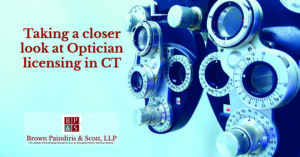Legal Regulations of CT Opticians
The human eye is a magnificent and complex biological structure. It is the gateway to the soul, a symbol of reality and the human experience, a communicator and the doorway to beauty. However, like other biological systems, sometimes the eye can be sick, deranged, and in need of competent medical evaluation and treatment. One possibility for treating the eye is through the use of eyeglasses, or another form of optical appliance, expertly crafted and adjusted by an optician.

Thus it is no surprise that in exercising the regulatory power of the State of Connecticut, it was long ago decided that the protection of the public required the regulation of opticians and optical appliances in the State (C.G.S. § 20-139). Much like other medical fields and products, the Connecticut Department of Public Health maintains the authority to regulate opticians through licensure, investigation and, if warranted, disciplinary action.
Through its regulation, the Department of Public Health seeks to ensure that eyeglasses and other optical products that correct vision and other visual abnormalities are of sufficient quality. Moreover, the Department wants to ensure that the individuals who create these eyeglasses and products, as well as fit them to consumers, have the education, skill, specialized training, and experience in technique to competently perform the same.
To serve this role, the State of Connecticut has a Board of Examiners for Opticians within the Department of Public Health. The Board of Examiners for Opticians (or Optical Board) is comprised of three members appointed by the Governor and includes two licensed opticians and one member of the public. The Optical Board has the authority to make rules to “govern the conduct of the business of dispensing or grinding optical glasses and instruments for the optical business…” as well as the power to “revoke, suspend or refuse to issue licenses, certificates of registration or permits for cause (C.G.S. § 20-141).”
The licenses that are typically handled by the Optical Board include the optician license, and the Optical Selling Permit, which allows business operation as an optical shop. An optician is someone having a knowledge of optics and who is skilled in the techniques of producing and reproducing ophthalmic lenses and mounting the same to supporting materials and the fitting of the same to the eyes.[1] A person applying for an optician license from the Board must have passed the optician exam, be of good moral character, and completed a lengthy apprenticeship period under a licensed optician (See C.G.S. § 20-145).
Beyond the licensed individual who is producing and fitting the lenses for customers, the optical shop itself must also be permitted by the Board. To permit an optical retail establishment, the Board requires a responsible optician to be listed on the application and license, who will oversee and supervise the business. Various regulations are in place for changing the responsible optician on a permit as well as the display of Optical Selling Permits and Optician licenses. There are also penalties by law for misusing these permits and licenses, or operating without having them issued.
Navigating the rules and regulations of Optician licensing and Optical Shop permitting can be tricky. Naturally, the stakes can be high for the professionals involved and their ability to practice the profession and perform their business. The administrative process can be time consuming and taxing. If you have questions about the Board of Examiners for Opticians, Optician licensing or Optical Selling Permits, contact Cody N. Guarnieri for a consultation today.






